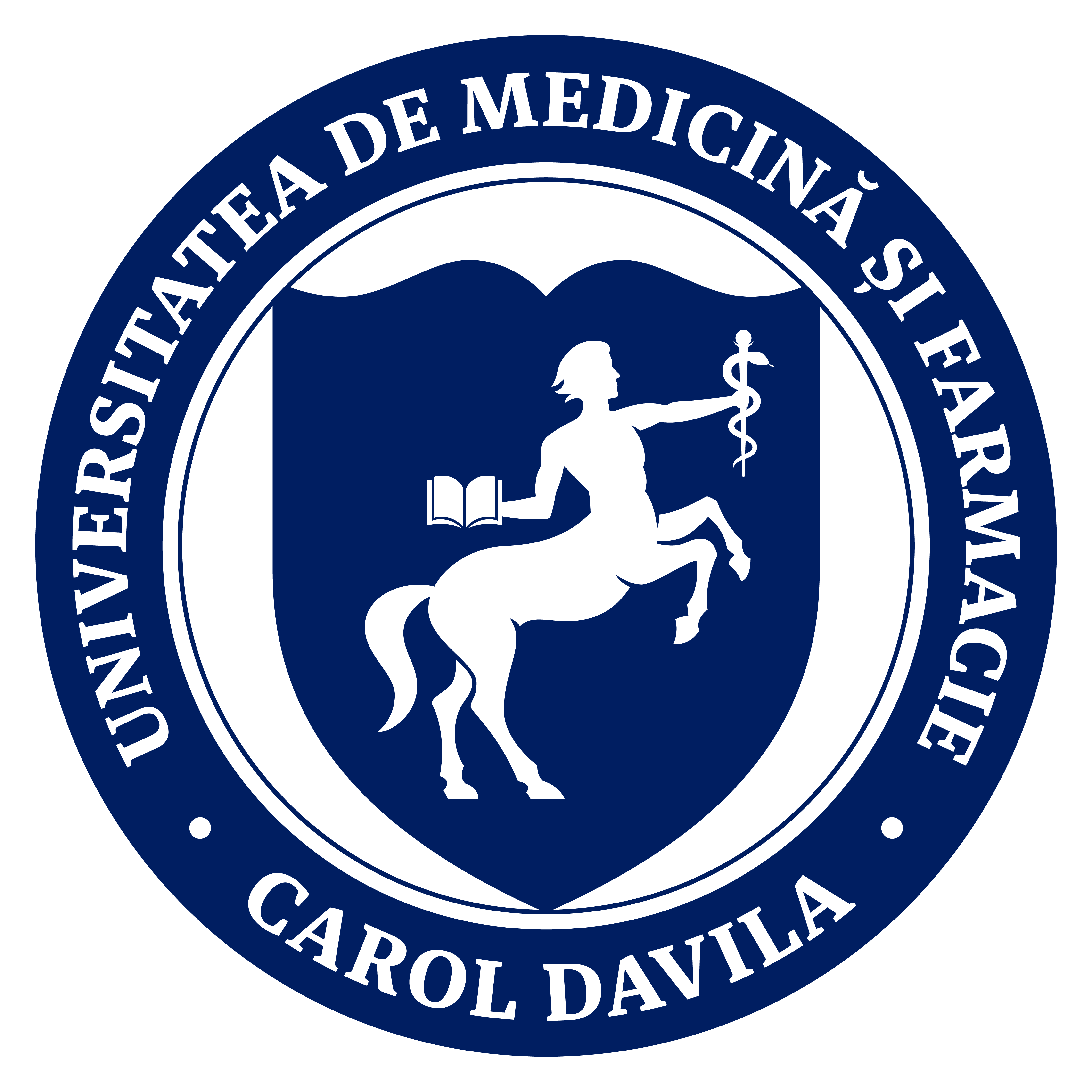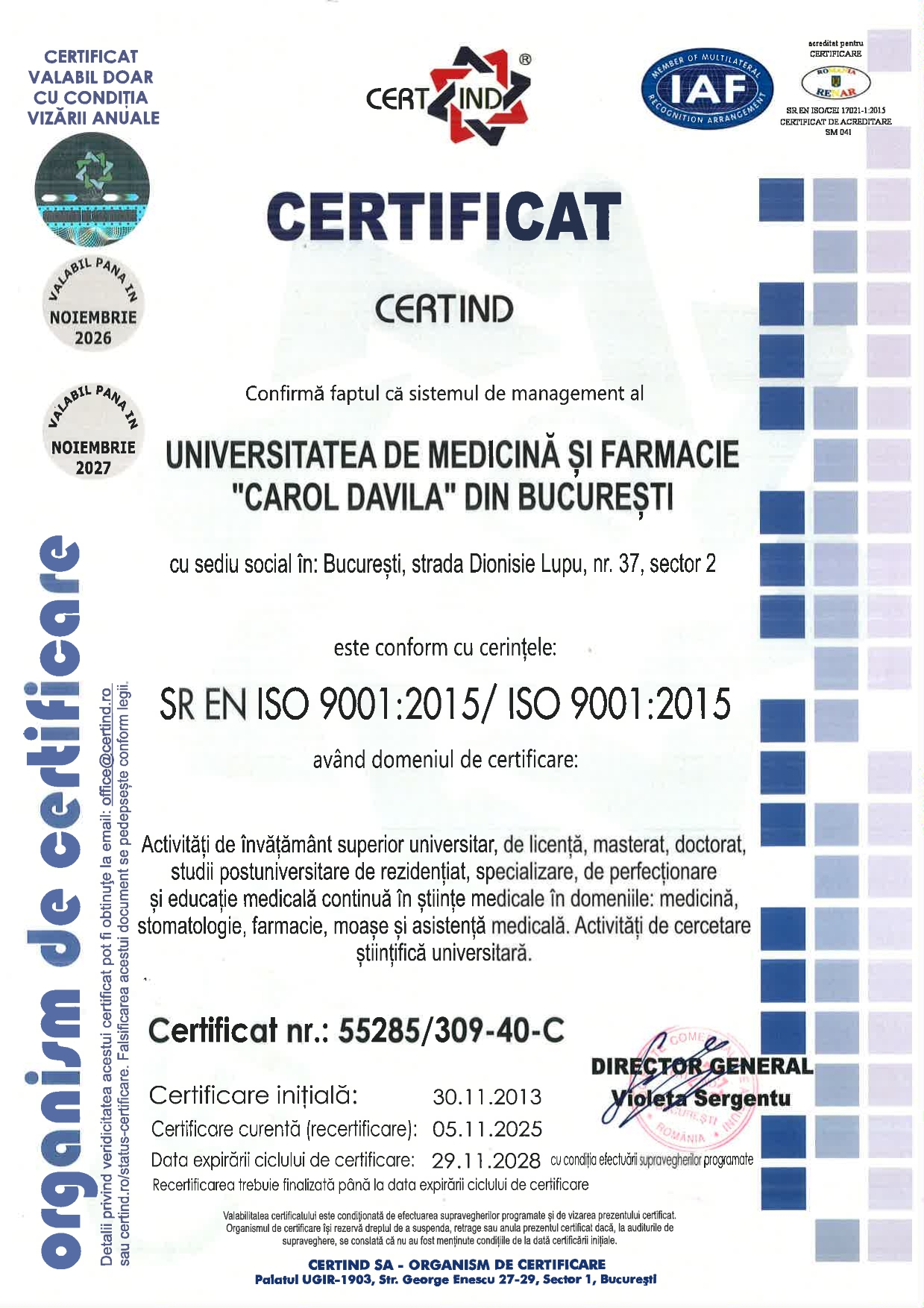Discipline - Food Hygiene and Nutrition
- List of academic staff
- Brief history of discipline
- Useful informations for students
- Useful information regarding postgraduate courses
- keywords
- Research projects
- 10 most significant scientific papers
- Lista cu cateva lucrări
| Professor | Zugravu Corina Aurelia, PhD | tenured |
| Head of works | Nuta Daniela, PhD | tenured |
Hygiene Discipline is one of the most important disciplines of UMFCD because it adressea a branch that today recieves a special attention: prevention, prevention of diseases of any kind. Starting from the well-known saying "it is easier to prevent than to treat" Hygiene deals with the preservation and promotion of health. In today's world, more and more factors of life and work environment tend to have a harmful action on the human body. From factors related to diet, to factors in the environment or at work, modern society tends to overload the defense mechanisms of metabolic and contribute to the onset of major diseases. If the begining of this discipline, the focus was on prevention of infectious contagious leading causes of illness and death at the time, today we focus on chronic diseases, degenerative, often called diseases of abundance, and that is on top in morbidity and current mortality. Practice has shown that these conditions can be prevented or improved by introducing measures incremental corrects mistakes food or action of environmental factors harmful and that the minimum investment in prevention, it reduces human suffering, and enormous financial burden individual and collective which itself draws from the need for long journeys treatment of chronic patients.
At our discipline, students come into contact with modern notions of disease risk assessment under the influence of a multitude of environmental and nutritional factors. They are also familiar with healthy lifestyle elements with modern techniques for assessing food intake or physical activity levels. The courses and practical applications are interactive and are made with modern techniques of assisted teaching digital course materials and exhaustive presentations.
Main research directions addressed by our discipline so far are evaluating food intake, risk analysis related to environmental factors and food, health promotion with special emphasis on nutritional factors / food assessing quality of life in population group diverse in Romania, analyze alternative forms of diet and their effects on health, deficiencies / nutritional deficiencies and their prevention, etc.
The Hygiene and Ecology Discipline takes place during a semester (14 weeks), with an equal number of courses and practical applications. In the classroom, it shows the theoretical notions concerning the environmental hygiene and food hygiene and for practical applications are presented laboratory techniques or other (in silico, traditional) risk assessment. The courses and practical applications are digital and paper.
Our discipline organizes postgraduate courses for doctors / nurses / pharmacists, whose theme varies annually. For the academic year 2016-2017 is planned the Vegetarian Food course, in April 2017. The course will last four days and will address nutritional issues related to adoption alternative types of diet based exclusively on vegetable food.
Our discipline is organizing a 120 credit Master Program of Nutrition and Food Safety. (Http://www.umf.ro/index.php/postuniversitar/master). The master presents notions of nutrition and food safety, among the subjects recalling:
- Assessment of nutritional status,
- obesity management,
- food-drug interaction,
- Anthropology food,
- nutrition Athlete Gastronomy and gastrotehnie, etc.
- food safety,
- risk assessment,
- risk management,
- risk communication,
- community nutrition,
- population studies,
- the transition nutritional food diseases,
- studies consumer habits,
- risk analysis on the factors of the environment (air, water, soil)
- Support to national dietary surveys in compliance with the EU menu methodology – OC/EFSA/DATA/2014/02 (2014-2018)
- ERASMUS PROGRAMMES INTENSIFS 2013-2014 -2013-DIJON31-1: Vegaprotiv (Vegetable proteins and Innovation) https://www.sites.google.com/site/vegaprotiv/home
- Update of the EFSA Comprehensive European Food Consumption Database – OC/EFSA/DCM/2013/01-CT03
- Bioanalytical Methods for Life Sciences-BM 51388-IC-1-2007-1-ROERASMUS- EUCX-1 Erasmus Intensive Programme (2009-2010)
- Zugravu CA, Pătrașcu D, Stoian A, Prejbeanu I. Cases of pellagra in contemporary Romania. Central European Journal of Occupational and Environmental Medicine, 2008, 14(4):379-384. HU-ISSN 1219-1221
- Zugravu C., Pătrașcu D., Prejbeanu I, Rada C. Gender differences in nutrition and lifestyle attitudes for a sample of Romanians. The Annals of the University Dunarea de Jos of Galati Fascicle VI – Food Technology, 2009; New Series Year III,32(1):83-90
- Zugravu C, Cilincă Igiena alimentatiei si nutritiei. Nutrientii. Editura Matrix Rom, Bucuresti, 2009. ISBN: 973-755-446-8
- Cilincă G, Zugravu C. Contaminarea alimentelor. Noutăți legate de igienă, detergenți și dezinfectanți, Editura Matrix Rom, București, 2010 . ISBN 978-973-755-434-5
- Zugravu CA, Pătrașcu D, Prejbeanu I, Tarcea M. Food label “check before buy” and association with demographic, nutritional and purchasing factors in a sample of Romanians.Annals. Food Science and Technology .2011; Vol. 22(12), Issue 1:22-29.
- Zugravu Sense of coherence and its connections with BMI and weight-related beliefs and attitudes International Journal of Collaborative Research on Internal Medicine & Public Health, 2012;Vol. 4(6):1131-1140.
- Zugravu C-A, Tarcea M, Șoptică F, Pătrașcu D., Stoian-Pantea A. Salt in Fast Food Products and Ready-to-Eat Sauces: Should it Be a Matter of Concern for Public Health?Bulletin UASVM Agriculture, 2012; vol 69(2):454-461
- Zugravu CA, Rada C. Quality of life determinants for Romanian mothers in urban communities, International Journal of Collaborative Research on Internal Medicine & Public Health, 2012;Vol. 4(12):1884-1892
- Șoptică F, Cîrîc A, Niculita P, Zugravu CA. Consumption volume and salt levels call for a substantive reformulation action on Romania`s foremost staple food: bread. Food Science and Technology 2012, Volume 13(2):223-230.
- Zugravu CA, Soptica F, Tarcea M, Cucu A. Pertinence of the vitamin D supplementation in the Romanian adult population. , FARMACIA, 2016, 64(3):467-472
- Zugravu CA, Pătrașcu D, Stoian A, Prejbeanu I. Cases of pellagra in contemporary Romania. Central European Journal of Occupational and Environmental Medicine, 2008, 14(4):379-384. HU-ISSN 1219-1221
- Zugravu C., Pătrașcu D., Prejbeanu I, Rada C. Gender differences in nutrition and lifestyle attitudes for a sample of Romanians. The Annals of the University Dunarea de Jos of Galati Fascicle VI – Food Technology, 2009; New Series Year III,32(1):83-90
- Zugravu C, Cilincă Igiena alimentatiei si nutritiei. Nutrientii. Editura Matrix Rom, Bucuresti, 2009. ISBN: 973-755-446-8
- Cilincă G, Zugravu C. Contaminarea alimentelor. Noutăți legate de igienă, detergenți și dezinfectanți, Editura Matrix Rom, București, 2010 . ISBN 978-973-755-434-5
- Zugravu CA, Pătrașcu D, Prejbeanu I, Tarcea M. Food label “check before buy” and association with demographic, nutritional and purchasing factors in a sample of Romanians. Food Science and Technology .2011; Vol. 22(12), Issue 1:22-29.
- Zugravu Sense of coherence and its connections with BMI and weight-related beliefs and attitudes International Journal of Collaborative Research on Internal Medicine & Public Health, 2012;Vol. 4(6):1131-1140.
- Zugravu C-A, Tarcea M, Șoptică F, Pătrașcu D., Stoian-Pantea A. Salt in Fast Food Products and Ready-to-Eat Sauces: Should it Be a Matter of Concern for Public Health?Bulletin UASVM Agriculture, 2012; vol 69(2):454-461
- Zugravu CA, Rada C. Quality of life determinants for Romanian mothers in urban communities, International Journal of Collaborative Research on Internal Medicine & Public Health, 2012;Vol. 4(12):1884-1892
- Șoptică F, Cîrîc A, Niculita P, Zugravu CA. Consumption volume and salt levels call for a substantive reformulation action on Romania`s foremost staple food: bread. Food Science and Technology 2012, Volume 13(2):223-230.
- Zugravu CA, Soptica F, Tarcea M, Cucu A. Pertinence of the vitamin D supplementation in the Romanian adult population. , FARMACIA, 2016, 64(3):467-472



